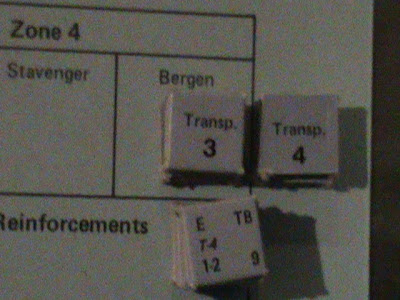
The weather abruptly clears for the last turn, and this meant that air strength for the first time in two months would not be halved. The Germans sent out 18 separate missions, going after airbases and destroyers in port, sinking 2 destroyers and destroying 3 air units on the ground out of 13 missions. They also did daylight terror bombing raids on East London and Bristol, hoping to draw the RAF away from protecting their airbases.
The Germans played fast and loose with their air units this turn, no longer having to worry about future group reductions. The British, on the other hand, having one final turn, did not have that luxury. As a result, the Germans piled up 9 VP's in their turn alone, and 10 more as a result of RAF group reductions.

Nevertheless, the British still had a chance to pull out a draw. They sent 6 sorties against German shipping at Bergen, Rotterdam, and Amsterdam, but were placing their main hopes on sinking the heavily damaged Hipper and Schlesien at Cuxhaven, North Germany. A sinking of either would have cut the gap. The sinking of both would have secured the draw.
The Whitley 5's couldn't get the job done, blowing the rolls.
The game ends with Germany with 276 VP's and UK 132, a 2:1 marginal victory.
So what are the results of this battle? The Royal Navy had been extremely damaged, its ability to protect shipping perhaps critically impaired. The Royal Air Force held its own against the Luftwaffe, but did not deliver the crushing blow they had accomplished in real life.

Destruction of the Royal Navy and RAF were a requirement of any invasion, so a spring attempt seems unlikely, given the ability of Britain to reequip during these months. So the Isles would be safe.
But what about the U-Boat wolfpacks? With a strained Navy, protecting shipping lanes and supplying Operation Compass in Egypt would be way difficult. Does Beda Fomm happen if the English are out of supply? And even if it had, the Afrika Korps would have loved to have taken their "armored reconnaissance" against such a foe. Tobruk would have surely fallen at the least, and with the supply line intact, the road to Cairo would have been a lot easier and quicker.

























